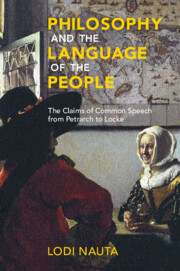Book contents
- Philosophy and the Language of the People
- Philosophy and the Language of the People
- Copyright page
- Contents
- Acknowledgments
- Introduction
- Chapter 1 Early Humanist Critics of Scholastic Language: Francesco Petrarch and Leonardo Bruni
- Chapter 2 From a Linguistic Point of View: Lorenzo Valla’s Critique of Aristotelian-Scholastic Philosophy
- Chapter 3 Giovanni Pontano on Language, Meaning, and Grammar
- Chapter 4 Juan Luis Vives on Language, Knowledge, and the Topics
- Chapter 5 Anti-Essentialism and the Rhetoricization of Knowledge: Mario Nizolio’s Humanist Attack on Universals
- Chapter 6 Skepticism and the Critique of Language in Francisco Sanches
- Chapter 7 Thomas Hobbes and the Rhetoric of Common Language
- Chapter 8 Between Private Signification and Common Use: Locke on Ideas, Words, and the Social Dimension of Language
- Conclusion
- Bibliography
- Index
Chapter 4 - Juan Luis Vives on Language, Knowledge, and the Topics
Published online by Cambridge University Press: 13 July 2021
- Philosophy and the Language of the People
- Philosophy and the Language of the People
- Copyright page
- Contents
- Acknowledgments
- Introduction
- Chapter 1 Early Humanist Critics of Scholastic Language: Francesco Petrarch and Leonardo Bruni
- Chapter 2 From a Linguistic Point of View: Lorenzo Valla’s Critique of Aristotelian-Scholastic Philosophy
- Chapter 3 Giovanni Pontano on Language, Meaning, and Grammar
- Chapter 4 Juan Luis Vives on Language, Knowledge, and the Topics
- Chapter 5 Anti-Essentialism and the Rhetoricization of Knowledge: Mario Nizolio’s Humanist Attack on Universals
- Chapter 6 Skepticism and the Critique of Language in Francisco Sanches
- Chapter 7 Thomas Hobbes and the Rhetoric of Common Language
- Chapter 8 Between Private Signification and Common Use: Locke on Ideas, Words, and the Social Dimension of Language
- Conclusion
- Bibliography
- Index
Summary
This chapter discusses the thought of Juan Luis Vives, who was a prominent voice in sixteenth-century debates on language and learning between humanists and scholastics. The chapter shows that, like Valla, Vives presents himself as a defender of common language and common sense. The notion of “common” turns out to be ambiguous. As the chapter makes clear, in most contexts the common language is Latin, but in Vives’s attacks on what he considered the linguistic and dialectical aberrations of his scholastic opponents, common language could also mean the usage and conventions of any linguistic community. Though his critique focuses on the Latin of his opponents, the point is sometimes phrased in terms that go beyond this particular language. This critique of scholastic language is part of a wider reform of language and learning that Vives thinks is necessary. The chapter therefore examines his views on the origins of language, its functions and purposes, and the role he assigns to the topics (loci) in thinking and argumentation. It is suggested that for Vives the topics form a grid through which we structure our thought and speech.
Information
- Type
- Chapter
- Information
- Philosophy and the Language of the PeopleThe Claims of Common Speech from Petrarch to Locke, pp. 95 - 126Publisher: Cambridge University PressPrint publication year: 2021
